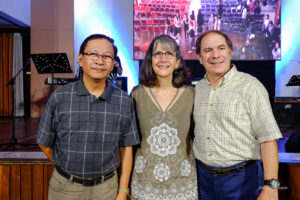I’ve been trying to learn how to take good and professional-looking portraits and I’m excited to learn more especially about taking headshots. In this photo is my lovely niece. It was a really hot summer day and my niece who is from overseas was really perspiring a lot. I was glad she did give a great smile for the camera despite the really warm weather. I’m interested in portrait photography and I hope to learn more about it. I guess I have varied interests. I love to take photos of nature too. And people in action doing things that they normally do everyday.
Category Archives: Life & Love
Penitents on Holy Week

Although the Catholic Church officially discourages penitents from practicing crucifixion and beating themselves up (self-flagellation) to atone for their sins, this long-held tradition continues in the Pampanga province among devoted Catholics. I heard that today, Good Friday, March 29, 2013, there were about 24 penitents who were nailed to their individual crosses.
Zeal for God
I do not want to be judgmental and question the motives of these devotees — my very own countrymen. I know many of them are very sincere in their devotion to God. God knows the inner thoughts and intents of their hearts. Instead, I look at them with respect and understanding. I’m actually fascinated by their zeal and dedication to reach out to God and to atone for their sins. Every year as I see this happening, I am reminded of St. Paul’s anguish over his very own people—the Jews—some two thousand years ago who were being destroyed for lack of knowledge. This was somewhat a similar situation back then. Paul said:
Missing the Mark
I feel the same way when I see my fellow countrymen who are zealously trying to reach out to God but are missing the mark for lack of knowledge. They need to know who the real Jesus really is who loves them so much such that he died for them. A penitent should see the truth that he does not need to literally beat himself up and nail himself to the cross each and every year! Truly, “people are destroyed for lack of knowledge” (Hosea 4:6).
Christ Died Already
St. Paul said, “While we were still sinners, Christ died for us” (Romans 5:8). Christ was already crucified for us! And Christ did it because he loves us. He loves all of us! We don’t need to crucify ourselves literally on the cross each year in order for God to love us. He already loved us even while we were still sinners! He continues to love us until now and forever!
Believe the Good News!
Let us believe this present reality that Christ was crucified and he died for us while we were still sinners. There is no need for us to pay for our own sins. Christ did it. It’s finished. Let us believe the truth that God loves the whole world so much that is why God is not willing that any should perish. Let’s change our thinking (repent) and believe the truth — the true gospel — Christ was crucified and already died for you! Believe it and enjoy life and love in Jesus for all eternity!
Related Blog:
***Updated: 3/26/2018
GCI Trinitarian Theology History As I Experienced It
This is how the Trinitarian theology doctrine developed in the Grace Communion International (GCI) which was formerly called the Worldwide Church of God (WCG) from my own experience as a church member in the Philippines beginning 1972 up the present. This is not a comprehensive history of how the incarnational, Trinitarian theology developed at GCI but rather a brief story of my own personal experience with it.
Trinity Doctrine Pagan
One of the major doctrines which I learned and believed in when I became a member of the Worldwide Church of God as a teenager in 1972 was that the Trinity doctrine was of pagan origin. We believed that the Trinity doctrine was a heretical and false idea. It had its roots from Nimrod I was told. We really believed we were right and I held on to that belief for some 18 years or so until a booklet was published around 1990 with the title, “God is…“ That booklet changed everything and many church members were shocked and outraged by it. Many left the church. It was a doctrine that introduced the Trinity doctrine as biblical truth which was totally contrary and opposite to the previous WCG belief taught by Herbert W. Armstrong.
Initial Exposure to Doctrinal Changes
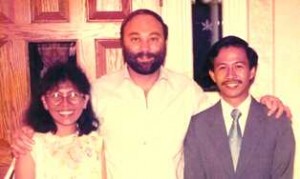
Back in 1987, as a young ministerial trainee, I and my wife had the privilege of attending a WCG ministerial conference in Pasadena, California. That was my very first exposure to the beginnings of various changes that would happen at WCG and that would continue from then on. I had the privilege to go back to Pasadena for another ministerial conference two years later in 1989. I heard more changes that were going on in the WCG’s faith and practice.
I remember that during that time, Dr. Mike Feazell was already explaining to us quite a number of errors in our Plain Truth magazine and in our other literature. He explained to us what we ministers ought to teach and preach instead. At that time, most of our WCG literature were all going through edits and revisions and some literature were pulled out of circulation.
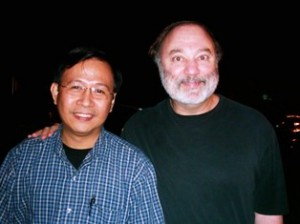
As an ordained minister, I had the privilege of being informed regularly about what was going at WCG on a weekly basis by Dr. Joseph Tkach himself, our current GCI President. Back then, he was the Director of Church Administration and he kept us informed of the latest developments in the WCG every week. Many members had left since then but I believed and embraced the changes that were being introduced. I knew what was really going on and the changes were sound and biblical to me.
Ministers Learn About Trinity Doctrine
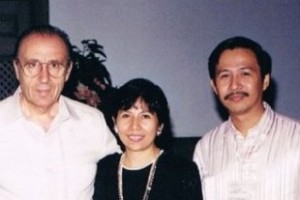
Sometime in 1993 and 1994, Dr. Kyriakos J. Stavrinides, a Greek theologian and classics professor from Ambassador College along with Dr. Joseph Tkach and others came to the Philippines for 2 consecutive years to explain to all of the WCG Philippine ministry the Trinity doctrine, the nature of God and what theology was all about. Most of us did not know about these things. Most of us did not go to seminaries. It was our first exposure to theology and the nature of God. It was a difficult time for many of the Philippine ministers. Many have left since then. It was my first time to hear that there was such a word as “Hermeneutics” which was introduced to us by Greg Albrecth of the Plain Truth Ministries. It was a challenging time for many of us trying to understand the new doctrines being explained.
How Doctrinal Changes Developed
As part of his lecture, Dr. Stavrinides explained to us how the doctrinal changes actually developed. Here is how it actually happened based on my notes from his lectures in 1994.
In our Plain Truth magazine and in our other publications, we have always said that the Trinity doctrine was false and was of pagan origin. A priest from New Jersey reacted to this and wrote to the then Pastor General Joseph W. Tkach Sr. in 1988. Another priest from Spain also reacted to a WCG publication in 1989. In 1990 a book entitled, “Another gospel” came out attacking the WCG. Because of all these negative reactions, Dr. Stavrinides was asked to help in crafting an official church statement on the deity of God. As a result, the Worldwide Church of God was removed from the list of cults. According to Dr. Stavrinides, WCG back then responded to critics by using weak and erroneous arguments.
In October 1990, a paper on the Trinity was published and the critics did not stop to criticize WCG. In November 1990, an article in the Plain Truth magazine was published with the title, “Who Was Jesus’ Father?” According to Dr. Stavrinides, the content of that article was in error.
He also said that he did not write the booklet, “God is…“ as some have wrongly supposed. According to him, people were upset about the booklet because it said that God is not as Herbert W. Armstrong (HWA) had thought of him. The booklet was right in saying that “God is one being” contrary to the old WCG belief that the Father and Jesus Christ are two God beings. Dr. Stavrinides added that the root of the problem was the lack of education of the readers regarding the subject.
Why WCG Changed its Doctrine
It was because of those priests, theologians and other critics who challenged the WCG view against the Trinity doctrine that made Pastor General Joseph W. Tkach Sr. respond by creating a doctrinal committee to refute them. At that point in time, he was sure that the WCG view was correct.
But as it turned out, the doctrinal committee found out from their studies that the critics were right about the Trinity doctrine after all! To be true and faithful to Scripture, that is why the doctrinal changes were made. Herbert W. Armstrong always taught: “Don’t believe me, believe the Bible!” That is exactly what WCG did when the error was pointed out.
That started the changes in the Worldwide Church of God. That’s how it happened as I learned it from others like Dr. Joseph Tkach, Dr. Mike Feazell, Dr. Dan Rogers as well as from Dr. Stavrinides. There was no conspiracy to change doctrine just for the sake of changing doctrine and stamping out the memory of HWA. We continue to love and respect HWA but he was not free from error too.
Personally, Dr. Stavrinides helped me a great deal in my initial understanding of the Trinity doctrine leading to more knowledge and understanding as I learned from others as well over the years. I heard he retired already and went back to Greece, his home country. I haven’t heard about him since then.
Healing Doctrine Changed
Back in 1989, I remember that one major doctrine that was changed was on our view on healing. We used to believe that going to doctors and taking medicine was a lack of faith. A booklet, “The Plain Truth about Healing“ was published and this was already a major change even before Pastor General Joseph W. Tkach shocked the whole worldwide denomination with major doctrinal changes which he publicly announced in December 1994. This booklet can still be found in our GCI website in several chapters. Church members in huge numbers left the church after December 1994. They forgot or they didn’t know that even HWA made changes in doctrine too. HWA changed the observance of Pentecost from Monday to Sunday in 1974. I was a new member in the church when Pentecost was changed.
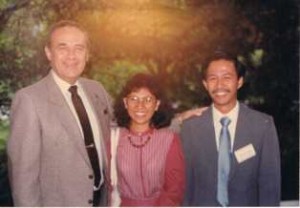
Pastor General Joseph W. Tkach Sr. announced the major doctrinal change in December 1994 regarding the Sabbath and the festivals. We no longer have to keep the Sabbath and the festivals contrary to the teachings of Herbert W. Armstrong. That’s when the income and membership of the church dropped very drastically when a lot more members left causing a lot of hurts, misunderstanding, splits and the start of more splinter groups.
Forced to Study Again
Since we were told that we made errors in our doctrines because we did not know how to properly interpret Scripture, I thought it was a good idea to learn all about it. So I took a summer class in 1996 on Hermeneutics and Theological Methods at the Asian Theological Seminary. Regional Director Bill Sidney encouraged me to study further which led me to enroll as a student in Biblical Studies at the Asian Theological Seminary in 1997. Since I was an irregular student, I graduated after some five years in 2001. To me, it further confirmed my belief that the doctrinal changes in my denomination were on the right track. This interest in Biblical Studies eventually led me to get interested in Theology.
Personal Outlook on the Changes
Here’s how I look at it. Where can you find a whole denomination that is willing to change to adhere to the biblical truth unmindful of the consequences namely: 1) loss of millions in income, 2) loss of thousands of members? That’s my denomination, GCI, transformed by truth. Transformed by the Lord Jesus Christ! We stand for the truth regardless of consequences. We were liberated from error. Thanks be to the Lord Jesus Christ!
First-ever Trinitarian Theology Conference
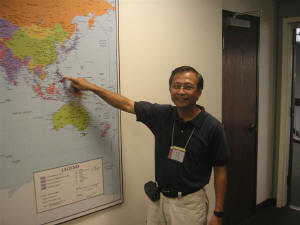
We began to learn more about Trinitarian theology in the years that followed. In 2007, I had the rare privilege of being able to attend the first-ever GCI Trinitarian Theology Conference in Palm Springs, California. That was my first time to hear Dr. C. Baxter Kruger in person. I was fascinated with what I learned there! (Sad to say, I lost all my photos of that conference! I accidentally deleted all of it from my computer!)
God surely was guiding and leading me along with the rest at GCI since the changes started for me in 1987. Beginning in 2007, I began to hear about Trinitarian theologians like Robert F. Capon, Thomas Torrance, Karl Barth and others. It was interesting for me to know that there were others who also believed in what we have newly-discovered to be the truth! We didn’t know that the “new truth” that God was allowing us to see had a name! They call it “Trinitarian theology!” Recently, our denominational leaders suggested that we call it “Incarnational Trinitarian Theology.”
GCI Philippines Trinitarian Theology Conference, 2010
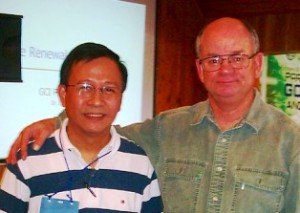
In February 2010, Dr. Mike Feazell, vice president of GCI, visited us in the Philippines and he also explained to all the GCI Philippine ministry what Trinitrarian theology was all about. He answered many questions from the pastors. I regret that he had to retire that soon. We’re both retired now from full time ministry. I consider him as one of my mentors since 1987 along with Dr. Joseph Tkach. I learned a lot from their writings and from hearing from them personally.
GCI Philippines Trinitarian Theology Conference, 2012

Last December 2012, Ted Johnston, GCI Ministry Developer and Communications Coordinator from GCI headquarters, also explained Trinitarian theology further to the GCI Philippine pastors and leaders gathered in three areas at Cebu City, Bicol and in Metro-Manila. I learned a lot as well from Ted Johnston through his emails since 1995 and even up to now through his blogs. I was glad to get to talk to him in person last December. I met him in 2007 in Palm Springs during the conference but he didn’t know me then personally. He only knew about me through emails. I also consider him as one of my mentors in Trinitarian theology. Be sure to read his blogs!

Back to back with Ted Johnston, Dr. Dan Rogers, the director of GCI Church Administration back then also visited the GCI Philippine ministry last December 2012 and also explained Trinitarian theology to all the pastors and leaders gathered in Baguio City. He also related to all of us the historical development of our Trinitarian theology and I was glad to hear that it matched perfectly well with what Dr. Stavrinides related to us years ago. He even added more information leading to our current understanding of this doctrine.
Theology is a Journey
Beginning in 2010 and even a few years before, I began to hear about Dr. Gary Deddo, the Founding President of the T. F. Torrance Theological Fellowship. He is now part of GCI and is our doctrinal adviser. Through his writings and videos, he has been of great help as well to me in my continuing study and journey to know the Lord Jesus more and more. He and his wife are a blessing to our denomination at GCI. I have learned a lot more since then and I still am learning! It was great to meet them personally recently.
Well, it’s been quite an exciting and challenging journey filled with both joy and sorrow. Despite the many explanations, seminars and lectures, some still continue to struggle to understand what Incarnational Trinitarian Theology is all about. I guess that would always be the case. We just have to continue growing in the grace and knowledge of our Lord Jesus Christ.
I thought I’d write my own version of what happened and what’s happening and I hope this is worth something if not for many, at least for some.
Have I arrived already? Do I know everything already? No. I find that I have a lot more to learn from my teachers and from the Lord Jesus Christ through the Holy Spirit.
And so the journey continues…
Related GCI History:
- Transformed by Truth, Dr. Joseph Tkach
- The Liberation of the Worldwide Church of God, Dr. Mike Feazell
- GCI History from the GCI website
- Called to be Free
Updated: October 2, 2018
The Imperative follows the indicative
Understanding the imperative and indicative statements found in the Bible is another key to getting a better overview of God’s intent and purpose for all of humanity. Some Christians get confused about the importance of good works in the life of a Christian. Some overvalue good works and say it is a requirement for salvation. On the other hand, some may undervalue it and and say that good works are not important. Some may think of it along these lines.
Imperative and Indicative Explained
So, what are imperative and indicative statements in the Bible? How are these two statements related? Well, simply stated, an indicative statement is a statement of fact. It tells us of what is already true in the Bible. It is a statement of reality. An imperative statement on the other hand is more of a command. It tells us what ought to be, what ought to be done—or not done. And yes, these two are related in the Bible. This is usually the pattern we see in Scripture.
Here are some examples. Paul said that God has “justified us freely by his grace” (Romans 3:24). He also said that “we have been justified through faith” (Romans 5:1). These are statements of what is already true in Christians. These are indicative statements. Paul was telling the believers who they already were in Christ.
In view of this fact, Paul then asked, “Shall we go on sinning so that grace may increase?” (Romans 6:1) Of course not! That’s what Paul essentially said in verse 2 in answer to his own question. This is an indirect way of saying “Don’t continue sinning. That’s wrong. That’s not the way it ought to be.” That is the imperative side of the coin.
Paul then explained in the rest of the chapter the need for righteous living in view of the fact that Christians were already in Christ — justified by grace through faith. In view of what is already true in Christians (indicative), they ought to behave accordingly (imperative) — based on who they were in Christ.
For another example in Romans 8, Paul continued to explain that these believers had already received the Spirit (Rom. 8:15) — the indicative statement — therefore they had an “obligation” to live according to the leading of the Holy Spirit and not according to the flesh (Rom. 8:12) — the imperative statement.
Become Who You Really Are!
Since Christians are already a new creation in Jesus Christ (2 Cor. 5:17), Paul was telling them to become who they really were! — as children of God, in Christ — Christians. Since Christians know that God’s love for them is so great and that they are his beloved children (indicative), the apostle John encouraged them to purify (imperative) themselves (1 John 3:1-3).
Christians should not go on sinning (imperative) John added. They were supposed to be “born again” Christians and therefore they should not continue living and practicing sin as a way of life (1 John 3:9). It is incompatible for a Christian to live an ungodly life.
This is essentially what Paul was telling Christians when he said that “grace (indicative) teaches us to say ‘No’ to ungodliness (imperative) (Titus 2:11-13).
In view of the indicative statements found in the Bible about who we already are in Jesus Christ, it is imperative upon us Christians to do that which is right before God. We don’t do “good works” in order to for us get reconciled back to God. Rather, we do “good works” because he has already reconciled us back to him! (2 Cor. 5;18-20).
We do “good works” because it is the right thing to do and the proper response to God’s love and grace that he has lavishly and freely given to us through Jesus Christ! This is essentially the important point which some get confused over. Since we are already in Christ (indicative), let’s act like one not contrary to it (imperative).
For Further Study:
- What are Indicatives and Imperatives of Grace in the Bible?
- Clarifying Our Theological Vision
- Sanctification
- Is Sin Transgression of the Law?
- George Hunsinger: Our Lives Are Hidden in Christ
- Chris Kettler: The Ministry of Ray Anderson
Photo credit: Google
Updated: 8/8/17
The Musical That Made Me Weep Silently

Without my realizing it, as my family and I were watching the emotion-packed movie, and as the story climaxed to the ending part of the musical drama film, Les Miserables, my tears rolled down from my eyes just naturally. That’s how touching the movie was for me, my wife and my daughter who also wept silently. And I’m sure many in the audience wept too quietly. It really touched everyone’s heart. The audience spontaneously clapped at the end of the film. It was a superb production.
For decades, I’ve heard the term, Les Miserables from time to time and I’ve heard how popular this musical drama has been through the years. I’ve also heard the name Victor Hugo but I never really bothered to take notice nor did it really interest me to get to know more about him. This movie really touched my heart and it got me into digging the background behind it all. My eldest daughter is different. She just loves reading novels, thick books and stuff like that—literature in general.
As one of the lady actresses sang, I suddenly remembered that Lea Salonga had been singing that song all along and I heard it from her first. I don’t even know the title of the song but it was a song of love from a lady who was unnoticed by the young man she loved so much. For many years I have also heard the French-sounding name Jean Valjean but before this, I also never really bothered to find out who he was until now. Now I know. Such a great story about human suffering, injustice, love, mercy, grace, God’s love and looking forward to a brighter tomorrow in the hands of our loving God. I highly recommend you watch this movie! You won’t regret it. Great actors and great musical drama film!


